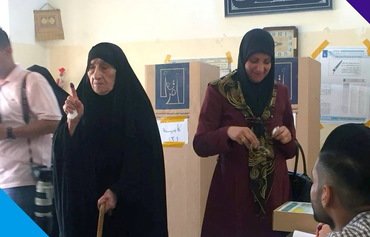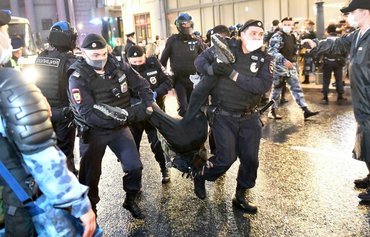A draft law that would criminalise sectarian and racial incitement was reintroduced to the Iraqi parliament last month.
The push to introduce a law that would penalise those who foment sectarian strife began in 2014, when civil society organisations, and the Nonsectarian Iraqis Foundation in particular, launched a popular campaign to enact legislation.
At the time, a large number of jurists, lawyers and researchers took part in demonstrations calling for its quick implementation.
A year after the campaign began, Iraqi parliamentarians collected signatures to adopt the bill, but the demands gradually subsided in light of the political and security events that overwhelmed the Iraqi arena.
The government's approval of the draft law is "the culmination of great efforts made by several popular and civilian parties over three years", said Hassan Faleh, president of the Nonsectarian Iraqis Foundation.
"Our demands were about the need to pass a special law that punishes all those who incite sectarianism and racism and who are trying to play on this chord with hateful rhetoric that attempts to place the wedge of differences and divisions among the people," he told Diyaruna.
Need for specific legislation
Iraq's constitution and other legislation, such as article 4 of the Anti-Terrorism Law, address sectarian discourse and actions.
However, Faleh said, these do not directly address this type of crime, and there are no texts that classify the crime or set out clear measures to be taken against those convicted with its commission.
"The adoption of the law is a good thing," he said. "But we also need to find an effective mechanism to apply it to reality."
Faleh proposed that a "security and social apparatus" be established to follow up and monitor violations of that law, and deter those who infringe it.
The adoption of a bill that would crimilalise sectarian incitement is part of "the government's attempt to preserve the significant gains made against terrorism in Mosul", said Ihsan al-Shammari, head of the Iraqi Centre for Political Thought.
With the reintroduction of the legislation, the government wants to "seize the opportunity to enhance community trust and heal cracks", he told Diyaruna. "It also aims to counter any campaigns or speeches that try to distort victory."
The legislation is based on Article 7 of the Iraqi Constitution, which prohibits the adoption or incitement of racism, terrorism and sectarianism, he said.
"It also is derived from the essence and provisions of Iraqi criminal law, which deal with the issue of fighting sectarianism and criminalising the entities and individuals that promote it," he added.
The bill will need to be ratified by the Iraqi parliament after a consensus of the political forces is reached "to pass it as a national necessity", al-Shammari said.
Holding violators to account
The resurrection of the bill is a "positive" step, said Iraqi MP Abdul Rahman al-Loizi, who has been a supporter and advocate of the new legislation.
He stressed the need for "a legal framework to hold accountable any individual or entity that promotes sectarianism and hatred and contributes to threatening the unity of the country and its public safety".
The bill must be signed into law without further delay, he told Diyaruna, stressing the need for "a common political will to enforce the law for it not to remain just a dead letter".
"There is no doubt that it will be subject to discussions and suggestions by members of parliament and the relevant parliamentary committees," he said. "Legal paragraphs may be added, deleted or modified to mature it until the final vote on it to enact it as a law."
In a statement following the July 18th session, the Council of Ministers announced that the draft law had been approved "in an effort to preserve the unity and integrity of the people and co-existence among all its components".

![An Iraqi man raises a banner demanding the criminalisation of sectarian incitement during an August 21st, 2015, demonstration in central Baghdad. [Photo from the Criminalising Sectarianism campaign Facebook page]](/cnmi_di/images/2017/08/01/8945-Iraq-sectarian-law-600_384.jpg)






